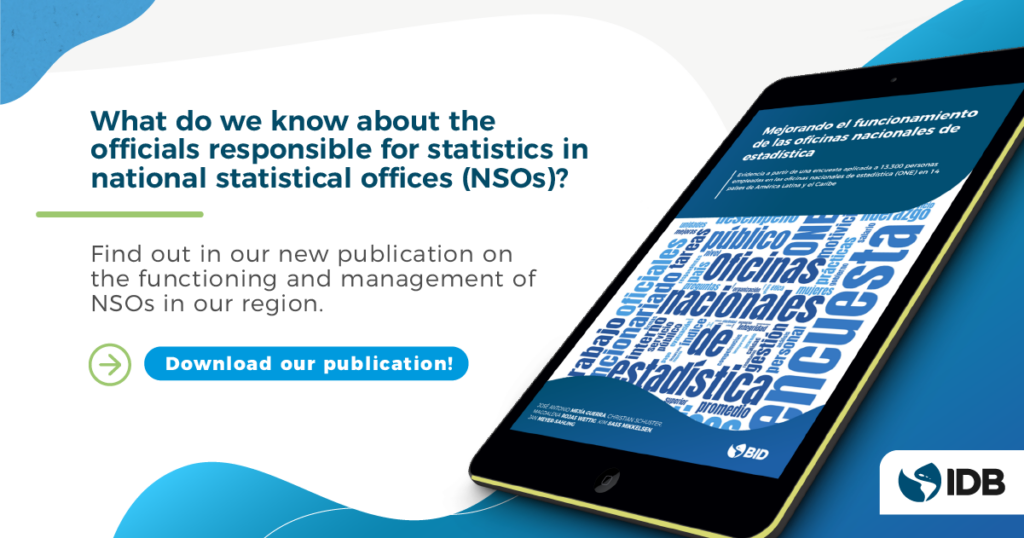High-quality national statistics are indispensable for effective policymaking. For instance, without high- quality poverty data, anti-poverty policies will target the wrong beneficiaries; and without high-quality inflation data, monetary policies will stimulate the economy in the wrong moments.
National Statistical Offices (NSOs) have thus spent decades perfecting instruments for statistical measurement. Yet, little is known about the officials who produce this statistical data.
How competent are statistic officials at their work? How motivated and ethical are they when producing data? And do NSOs manage them effectively? The answers are central to improving statistical capacity. Nonetheless, NSOs have not developed systematic measurement instruments to identify them.
A recent IDB publication – Making National Statistical Offices Work Better – addresses this gap, presenting the results of a survey of 13,300 NSO Employees in 14 Countries in Latin America and the Caribbean, and these are 4 of the main findings extracted from the report.
Do you want to discover four key lessons to create a data-informed roadmap to manage employees of NSOs better?
1. Effective management of national statistics officials is crucial for ensuring the quality of national statistics.
For instance, greater competence of statistics officials correlates with greater statistical performance of an NSO, as does the quality of recruitment and selection of statistics officials in NSOs, as illustrated below.
World Bank Statistical Performance Indicators vs. Recruitment and Selection Quality of NSO employees as measured by the NSO employee survey

2. Most statistics officials are motivated in their jobs and committed to their NSO – yet many struggle with basic statistical competencies.
For instance, 84% of statistics officials are satisfied with their job; 78% are motivated to work hard; and 68% recommend their organization as a good place to work. These values are very similar to those of public servants generally, according to the Global Survey of Public Servants. At the same time, in a short exam embedded in the survey which measures basic statistical competencies (such as descriptive statistics and probability), only 50% of NSO officials with statistical tasks in their jobs answered at least half of the statistics questions correctly, as illustrated below. This puts a premium on management practices to strengthen statistical competence in NSOs.
Statistical Competence: Share of Statistics Officials Answering at least Half of Statistics Exam Correctly, by National Statistical Office (NSO)

3. National Statistical Offices have ample room to improve management practices to enhance statistical capacity.
For instance, pay perceptions in NSO are significantly worse than in central governments generally. Only 21% of NSO employees are satisfied with their salary and 25% would find it easy to find a job in the private sector that pays better than their NSO job, threatening retention of staff.
Moreover, merit-based recruitment and selection could be significantly strengthened to ensure the selection of competent staff. NSO jobs are often not publicly advertised, but instead disseminated through word of mouth (51% of respondents). Methodological and/or statistical programming skills are rarely assessed when selecting statistics officials (34%). Connections – support from friends, family or politicians – had importance in the recruitment of a significant minority of NSO employees (27%).
Survey results also underscore margins for improvement in a range of other management practices – from merit-based career development opportunities to gender equality in managerial ranks, from proper onboarding practices of new employees to consistent good practice performance appraisals, support for hybrid work, protection of job stability during government transitions, among others. Improvements in managing NSOs matter as the quality of management practices measured in the survey significantly correlates with staff motivation, commitment, integrity and competence.
4. Finally, despite sharing similar functions, NSOs exhibit diversity in management practices and in the motivation and competence of their employees.
For instance, the share of employees recommending their organization as a good place to work varies from 43% to 85% across NSOs in Latin America and the Caribbean. Similarly, the Quality of Leadership Index varies between NSOs from 43 to 85 (0-100 scale) and, inside a single NSO, from 43 to 87 across different departments. Different NSOs – and different departments inside them – thus require different management improvements.
Quality of Leadership Index, by department inside each NSO

How can NSOs identify where and how to improve?
The NSO employee survey is available to replicate in our web portal. This website contains the survey questionnaire (in English and Spanish), sample NSO diagnostic reports and an example video to encourage employee participation in the survey. By replicating the survey and leveraging the insights gained, NSOs can strengthen their management practices and enhance statistical capacity effectively and at low cost.
This study is part of the IDB’s active commitment to the development of statistical capacity in the region. Defining it as the ability to produce quality statistics and the ability to use these data to create public value by informing public and private decision making. The statistical capacity of a country is hence linked to the possibility of making evidence-based policy decisions and results-based public management. Which fosters transparency and accountability.
In this way, the IDB further contributes to build statistical capacity, but now from the perspective of those responsible for the production of official statistics. By improving management practices and addressing issues like job satisfaction and career development, NSOs can create an environment conducive to producing better statistical data. This will not only enhance NSOs’ performance but also provide policymakers with accurate data to develop impactful public policies, thereby improving lives across Latin America and the Caribbean.
This document complements the institutional vision of statistical capacity presented in Who wants to know?: The Political Economy of Statistical Capacity in Latin America.
In case of questions, do not hesitate to get in touch with the authors at [email protected] and [email protected].
Download our new publication “Making National Statistical Offices Work Better” now!



Leave a Reply